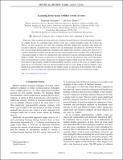Learning from many collider events at once
Author(s)
Nachman, Benjamin; Thaler, Jesse
DownloadPublished version (1021.Kb)
Publisher Policy
Publisher Policy
Article is made available in accordance with the publisher's policy and may be subject to US copyright law. Please refer to the publisher's site for terms of use.
Terms of use
Metadata
Show full item recordAbstract
There have been a number of recent proposals to enhance the performance of
machine learning strategies for collider physics by combining many distinct
events into a single ensemble feature. To evaluate the efficacy of these
proposals, we study the connection between single-event classifiers and
multi-event classifiers under the assumption that collider events are
independent and identically distributed (IID). We show how one can build
optimal multi-event classifiers from single-event classifiers, and we also show
how to construct multi-event classifiers such that they produce optimal
single-event classifiers. This is illustrated for a Gaussian example as well as
for classification tasks relevant for searches and measurements at the Large
Hadron Collider. We extend our discussion to regression tasks by showing how
they can be phrased in terms of parametrized classifiers. Empirically, we find
that training a single-event (per-instance) classifier is more effective than
training a multi-event (per-ensemble) classifier, as least for the cases we
studied, and we relate this fact to properties of the loss function gradient in
the two cases. While we did not identify a clear benefit from using multi-event
classifiers in the collider context, we speculate on the potential value of
these methods in cases involving only approximate independence, as relevant for
jet substructure studies.
Date issued
2021Department
Massachusetts Institute of Technology. Center for Theoretical PhysicsJournal
Physical Review D
Publisher
American Physical Society (APS)
Citation
Nachman, Benjamin and Thaler, Jesse. 2021. "Learning from many collider events at once." Physical Review D, 103 (11).
Version: Final published version